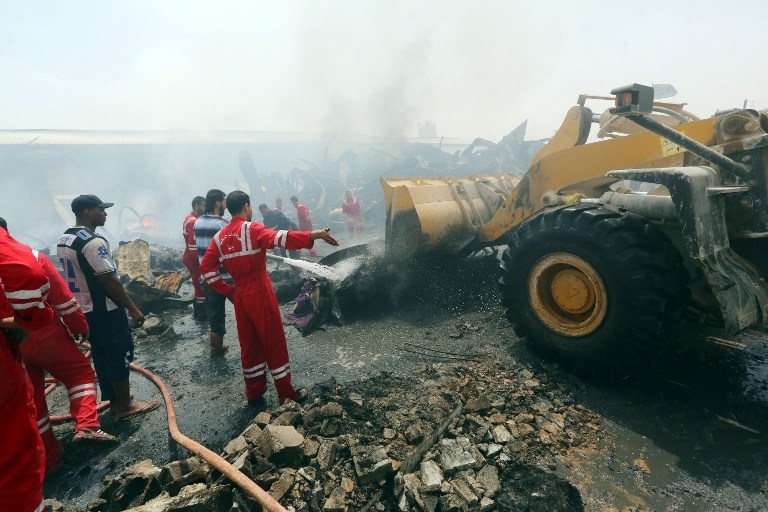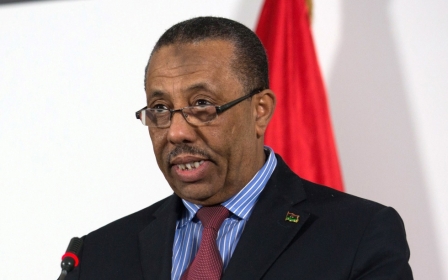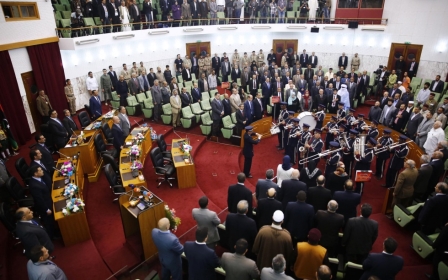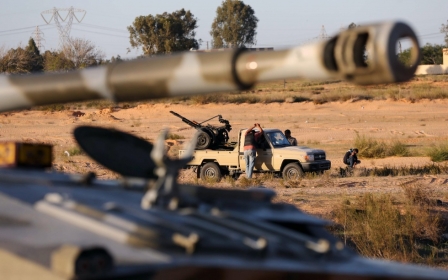Turmoil in Libya continues as key generals support 'anti-militia' moves

One person was killed and at least four others injured when a rocket struck a commercial area in Tripoli late on Tuesday night, eyewitnesses said.
This was followed by a botched assasination attempt on the navy chief Rear Admiral Hassan Abu Shnak, whose convoy was targeted in Tripoli on Wednesday.
The two events come on the back of a nationwide escalation in violence that began last Friday during which almost 80 people have been killed and a further 160 injured.
The rocket attack in Tripoli caused a fire that spread into several shops in the southeastern district of Sidra.
Eyewitnesses told Turkish Anadoulu Agency that they believed the rocket had been fired from a southwesterly direction.
New MEE newsletter: Jerusalem Dispatch
Sign up to get the latest insights and analysis on Israel-Palestine, alongside Turkey Unpacked and other MEE newsletters
Eyewitnesses also said that the rocket might have been aiming at - but missed - a militia camp located near the area.
Last Friday, retired general Khalifa Haftar launched an offensive in Libya's second city Benghazi to purge what he claims are Islamists-inspired militias who have taken root there.
Some elements within Libya's official military have since declared their support for the renegade general, although it remains to be seen whether further defections will take place, and how permanent the current alliance between Haftar and some army leaders will be.
On Wednesday, the head of the Libyan navy survived an assassination attempt in the capital Tripoli.
It is unclear who perpetrated the assault, and no group has yet claimed responsability.
Rear Admiral Hassan Abu Shnak, his driver and two bodyguards were slightly injured when unidentified gunmen attacked their convoy, naval spokesman Ayoub Qassem told Libya's official news agency LANA.
The upswing in violence has sparked fears that Libya may be slipping towards civil war.
While Haftar says he has taken up arms against militia groups, many of these groups at least officially serve as part of Libya's regular army.
Haftar has managed to gather support in the west and also in eastern Libya, while his forces are also believed to be behind the storming of Libya's parliament in Tripoli on Sunday.
Following a spate of early proclamations of support for Haftar and his "Operation Dignity" campaign, on Tuesday several more key army generals threw their weight behind Haftar.
Chief of Staff of the Libyan Air Defence Force Brigadier Jomaa al-Abani announced his support for the offensive.
Abani called on the rest of the Libyan Air Defence Force troops to follow suit, in a televised speech which was broadcast in the early hours of Wednesday.
"I am with the Libyan people against all types of terrorism," Abani said.
Former Prime Minister Ali Zeidan, along with the commander of Libyan Special Forces as well as army and security forces in the eastern city of Tobruk, also declared support for Haftar's pampaing to "purge" Libya of "extremists."
The Libyan parliament has slammed Haftar's operation as a "coup" against electoral "legitimacy” although the GNC has now promised to hold new elections on 25 June in an attempt to stabilise the situation.
A source from the military judiciary told Anadolu Agency earlier on Wednesday that Abani is wanted by the Libyan military prosecution for alleged involvement in arranging meetings for military officers without the knowledge of the army leadership.
Libyan authorities have struggled to restore law and order since Gaddafi's ouster and death in 2011 amid the continued refusal of armed militias - who helped overthrow the late leader - to give up their weapons.
Middle East Eye delivers independent and unrivalled coverage and analysis of the Middle East, North Africa and beyond. To learn more about republishing this content and the associated fees, please fill out this form. More about MEE can be found here.




